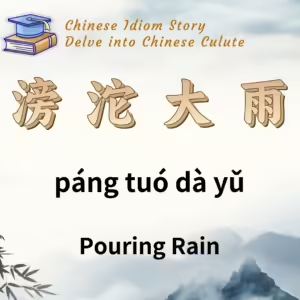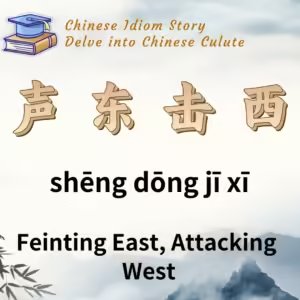
Chinese Idiom: 倾盆大雨 (Qing Pen Da Yu)
English Translation: Pouring rain
pīn yīn: qīng pén dà yǔ
Idiom Meaning: This idiom describes a very heavy downpour of rain, evoking an image of rain pouring down as if from a bucket.
Historical Source: Du Fu’s Poem “White Emperor” (唐代杜甫《白帝》诗)
Idiom Story:
The Yangtze River, known as the first river of China, flows through the steep Wushan Mountains, creating the famous and picturesque Three Gorges. The western end of the Three Gorges begins at Baidi City in Fengjie County, Chongqing, and stretches east to Haijun Pass in Yichang, Hubei Province. Baidi City, perched atop Baidi Mountain, rises high, and from below, it appears to soar into the clouds, inspiring the famous lines from Li Bai, “In the morning, I bid farewell to Baidi amidst the colorful clouds.”
Baidi City was established during the late Western Han Dynasty under Wang Mang’s rule. During the Three Kingdoms period, the warlord Liu Bei, after suffering defeat in Eastern Wu, entrusted his affairs to the strategist Zhuge Liang at this location.
Numerous poets have penned verses about the breathtaking scenery and mystical tales surrounding Baidi City. In the first year of the Dali reign (AD 766) of Emperor Suzong of the Tang Dynasty, the poet Du Fu traveled from Yun’an (modern-day Yunyang County, Sichuan) to Kuizhou (modern-day Fengjie, Chongqing), where he visited Baidi City twice and wrote two seven-character regulated verse poems, one of which is titled “White Emperor.” The poem features eight lines:
白帝城中云出门,
白帝城下雨翻盆。
高江急峡雷霆斗,
古木苍藤日月昏。
戎马不如归马逸,
千家今有百家存。
哀哀寡妇诛求尽,
恸哭秋原何处村?
In this poem, the phrase “雨翻盆” (the rain pouring like it has been overturned from a pot) gives rise to the idiom “倾盆大雨.” The first four lines describe the overwhelming clouds and pouring rain, while the last four lines express Du Fu’s dissatisfaction with the chaotic state of the country following the An Lushan Rebellion and the oppression of the common people by greedy rulers.
The imagery captures the essence of heavy rain that symbolizes the turmoil and darkness in society, reflecting Du Fu’s deep empathy for the suffering of the people during a time of strife. Through this vivid description, the idiom “倾盆大雨” conveys not just the intensity of the rain but also the weight of the surrounding circumstances, linking nature’s fury with human suffering.






